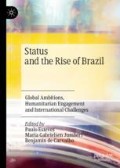Abstract
International analysts who follow Brazil’s political, economic, and social life suggest the country’s trajectory throughout the Workers Party governments could be told through the succession of magazine covers on the Latin American version of The Economist. The first of such editions, from November 2009, printed the iconic image of Christ the Redeemer taking off (“Brazil takes off”), in sync with the optimism expressed on the evaluations at the end of Lula da Silva’s two terms (2003–2010). The second one, from September 2013 (“Has Brazil blown it?”), prints the Christ, with its turbines from the previous edition malfunctioning, heading for a fatal crash at Guanabara Bay. This cover story translated the general perception that Dilma Rousseff, reaching the end of her first term, had apparently failed to maintain the management model, the social dialogue, and the foreign policy bequeathed by her predecessor. The third edition, from April 2016 (“The betrayal of Brazil”), printed Christ the Redeemer holding a sign pleading for help, and the main story presented an assessment of the political and institutional crisis that divided the country and would lead to Dilma Rousseff’s impeachment some months later (The Economist 2009, 2013, 2016).
Access this chapter
Tax calculation will be finalised at checkout
Purchases are for personal use only
Notes
- 1.
It is well known that Brazil was considered to be included as a permanent member of the Security Council at the founding moment of the United Nations. In spite of the fact that the country has taken part in the Security Council as a non-permanent member more than a dozen times since 1945, it is notable that the idea of a candidature firmly declared to a permanent seat was only verbalized during the first Cardoso government (1995–1998), and was soon abandoned, in 1997.
- 2.
During the PT cycle, 75 new diplomatic posts were opened with new embassies, consulates, and missions to international organizations, adding to the 150 already existing.
- 3.
Garcia was a personality with a long history in the Workers Party and who for a long period has been engaged with international issues and even occupied the position of the Party’s Secretary for international relations.
- 4.
Data compiled by the authors through information from the Brazilian Presidency of Republic.
- 5.
Data compiled by the authors through information from the Brazilian Presidency of Republic.
References
Amorim, Celso. 2010. Brazilian Foreign Policy Under President Lula (2003–2010): An Overview. Revista Brasileira de Política Internacional 53 (spe): 214–240.
Briceño-Ruiz, José. 2010. From the South American Free Trade Area to the Union of South American Nations: The Transformations of a Rising Regional Process. Latin American Policy 1 (2): 208–229. https://doi.org/10.1111/j.2041-7373.2010.00016.x.
Burges, Sean. 2014. Brazil’s International Development Co-Operation: Old and New Motivations. Development Policy Review 32 (3): 355–374.
Cason, Jeffrey W., and Timothy J. Power. 2009. Presidentialization, Pluralization, and the Rollback of Itamaraty: Explaining Change in Brazilian Foreign Policy Making in the Cardoso-Lula Era. International Political Science Review 30 (2): 117–140.
Cervo, Amado Luiz. 2010. Brazil’s Rise on the International Scene: Brazil and the World. Revista Brasileira de Política Internacional 53 (spe): 7–32.
Cervo, Amado Luiz, and Antônio Carlos Lessa. 2014. O Declínio: Inserção Internacional Do Brasil (2011–2014). Revista Brasileira de Política Internacional 57 (2): 133–151.
Gardini, Gian Luca. 2016. Brazil: What Rise of What Power? Bulletin of Latin American Research 35 (1): 5–19.
Gehre, Thiago. 2010. Brazil and South America: Lula and the Quest for ‘International Respect.’. In Relations Internationales Du Brésil, Les Chemins de La Puissance: Aspects Régionaux et Thématiques, ed. Denis Rolland and Antônio Carlos Lessa, 1st ed., 51–66. Paris: Harmattan.
———. 2012. Uma História de Parceria: As Relações Entre Brasil e Venezuela (1810–2012). 1st ed. Belo Horizonte: Fino Traço Editora.
Inoue, Christina Y. A. 2012. Governance of Global Climate Change in the Brazilian Amazon: The Case of Amazonian Municipalities of Brazil. Revista brasileira de política internacional 55: 170–189.
Lessa, Antônio Carlos. 2010. Brazil’s Strategic Partnerships: An Assessment of the Lula Era (2003–2010). Revista Brasileira de Política Internacional 53 (spe): 115–131.
Malamud, Andrés. 2011. A Leader Without Followers? The Growing Divergence Between the Regional and Global Performance of Brazilian Foreign Policy. Latin American Politics and Society 53 (3): 1–24.
Merke, Federico. 2015. Neither Balance nor Bandwagon: South American International Society Meets Brazil’s Rising Power. International Politics 52 (S2): 178–192.
Oliveira, Henrique Altemani de. 2012. Brasil e China: Cooperação Sul-Sul e Parceria Estratégica. 1st ed. Belo Horizonte: Fino Traço.
Pecequilo, Cristina Soreanu. 2010. A New Strategic Dialogue: Brazil-US Relations in Lula’s Presidency (2003–2010). Revista Brasileira de Política Internacional 53 (spe): 132–150.
Silva, André Luiz Reis da. 2015. Geometria Variável e Parcerias Estratégicas: A Diplomacia Multidimensional Do Governo Lula (2003–2010). Contexto Internacional 37 (1): 143–184.
Stuenkel, Oliver. 2016. Do the BRICS Possess Soft Power? Journal of Political Power 9 (3): 353–367.
The Economist. 2009. Brazil Takes Off. February 20. Available from https://www.economist.com/leaders/2009/11/12/brazil-takes-off. Access 15 Jan 2019.
———. 2013. Has Brazil Blown It? Brazil’s Future. February 20. Available from https://www.economist.com/leaders/2013/09/27/has-brazil-blown-it. Access 15 Jan 2019.
———. 2016. The Great Betrayal; Brazil. February 20. Available from https://www.economist.com/leaders/2016/04/23/the-great-betrayal. Access 15 Jan 2019.
Vigevani, Tullo, and Haroldo Ramanzini Júnior. 2010. The Changing Nature of Multilateralism and Brazilian Foreign Policy. The International Spectator 45 (4): 63–71.
Viola, Eduardo, and Larissa Basso. 2016. Wandering Decarbonization: The BRIC Countries as Conservative Climate Powers. Revista Brasileira de Política Internacional 59 (1). https://doi.org/10.1590/0034-7329201600101.
Author information
Authors and Affiliations
Corresponding author
Editor information
Editors and Affiliations
Rights and permissions
Copyright information
© 2020 The Author(s)
About this chapter
Cite this chapter
Lessa, A.C., Becard, D.S.R., Galvão, T.G. (2020). Rise and Fall of Triumphalism in Brazilian Foreign Policy: The International Strategy of the Workers Party’s Governments (2003–2016). In: Esteves, P., Gabrielsen Jumbert, M., de Carvalho, B. (eds) Status and the Rise of Brazil. Palgrave Macmillan, Cham. https://doi.org/10.1007/978-3-030-21660-3_5
Download citation
DOI: https://doi.org/10.1007/978-3-030-21660-3_5
Published:
Publisher Name: Palgrave Macmillan, Cham
Print ISBN: 978-3-030-21659-7
Online ISBN: 978-3-030-21660-3
eBook Packages: Political Science and International StudiesPolitical Science and International Studies (R0)

